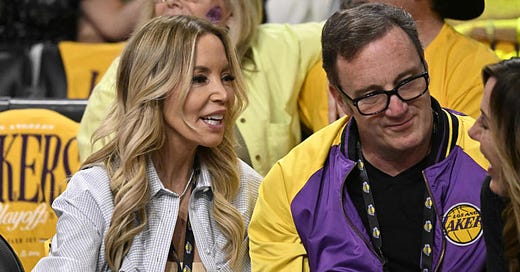The $10 Billion Lakers: Why Mark Walter’s Move Would Reshape NBA Power
He already owns the Dodgers, Chelsea, and part of the Lakers, but if this deal closes, Walter’s empire would rewrite the rules of modern sports ownership.
In 1979, Jerry Buss bought the Los Angeles Lakers for $67.5 million. That price got him the Lakers, the NHL’s Kings, and The Forum. Forty-five years later, a deal is now in motion to sell majority ownership of the Lakers alone in a transaction reportedly valuing the franchise at $10 billion.
But this isn’t just a headline about money. This is a moment that could redraw the NBA’s power map. Because if the agreement goes through, it won’t just mark the end of the Buss family’s era, it will usher in a new one defined by Mark Walter, the quiet billionaire assembling one of the most expansive ownership portfolios in global sport.
Walter already owns 20% of the Lakers. Now, according to reports from ESPN’s Shams Charania and others, he’s negotiating to acquire a controlling stake from the Buss family, who currently hold about two-thirds of the team. The deal hasn’t yet closed, but it’s real, and when it closes, it will change the direction of one of the NBA’s most storied franchises.
Walter isn’t just another investor looking for a shiny asset. He’s the chairman and CEO of TWG Global, the controlling owner of the LA Dodgers, and has stakes in Chelsea FC, the LA Sparks, and various motorsports interests, including the new Cadillac Formula 1 Team joining in 2026. What he’s building is bigger than a team; it’s a vertically integrated, multi-league empire across the biggest sports markets in the world.
In that context, the Lakers become a centrepiece, not a trophy. They’re the content engine. The cultural capital. The crossover asset that gives Walter leverage in everything from media rights to global brand strategy. Buying the Lakers isn’t just about basketball; it’s also about owning attention.
That’s why this proposed deal hits differently. Jerry Buss was the prototype for the hands-on, Hollywood-flavoured team owner. He turned the Lakers into a spectacle. Under his daughter Jeanie’s watch, they added another championship in 2020 and shocked the league this season by landing Luka Dončić. But the NBA’s economic and media landscape has shifted. Ownership is no longer about inheritance or emotion. It’s about platforms, portfolios, and strategic alignment.
Follow me for more sports and life updates: Instagram
Walter fits that mould. Since acquiring Phil Anschutz’s stake in 2021, he’s held first rights of refusal on any sale of the Buss family’s shares. That clause is now coming into play. The exact percentage Walter is negotiating for hasn’t been disclosed, and Jeanie Buss is expected to remain involved as team governor. But when the majority control changes hands, the symbolic weight is massive. The last time an NBA team of this stature was sold, it was the Celtics, earlier this year, for $6.05 billion. That was a record. The Lakers’ valuation nearly doubles it.
Valuations don’t jump like that for nothing. The Lakers aren’t just a top-tier team. They’re a top-tier product. According to CNBC, they were worth $7 billion earlier in 2025. But the new figure reflects more than what happens on the court. It’s about global brand reach, monetisable fandom, and potential upside in the next wave of NBA media rights.
Those rights are expected to exceed $70 billion league-wide, with new streaming-first packages, team-specific carve-outs, and even direct-to-consumer possibilities on the table. If the NBA starts letting teams take more control of their own digital content, the Lakers become the golden goose. Walter knows that. And he’s positioning himself accordingly.
From a cultural standpoint, the Lakers remain one of the few American sports brands with true international appeal. They’re a fashion brand, a media machine, a social media heavyweight. Adding them to a portfolio that already includes the Dodgers and Chelsea means consolidating influence across continents and fan bases.
Magic Johnson, who knows the Lakers inside out and now co-owns the Dodgers with Walter, publicly supported the sale this week. On X, he called Walter “driven by winning, excellence, and doing everything the right way.” For Lakers fans, that’s more than a pat on the back; it’s a signal of intent.
Still, this is the end of something. The Buss family has owned the Lakers for over four decades, through dynasties, droughts, tragedy, and transformation. Jerry Buss wasn’t just a team owner. He revolutionised the business of basketball, blending celebrity culture, courtside spectacle, and elite talent into a globally recognisable package.
Jeanie carried that vision forward in her own way, modernising while maintaining legacy. But legacy alone doesn’t compete in today’s market. In today’s NBA, ownership is strategic, not sentimental.
Walter, who rarely speaks publicly, won’t come in with fanfare. But if his track record with the Dodgers is anything to go by, he’ll bring stability, big investment, and long-term vision. That’s good news for fans who care about winning.
The Buss family turned the Lakers into a global powerhouse. Now, Mark Walter looks set to build on that legacy and scale it for a new era.
Thanks for reading, David Skilling.
Follow me on LinkedIn | X | Instagram
If you hit the like button, you’ll be doing me a huge favour, and if your business needs sports writing, wants to discuss advertising, or you have PR stories to pitch, feel free to get in contact.
If you know someone who will enjoy this article, please share it with them.




